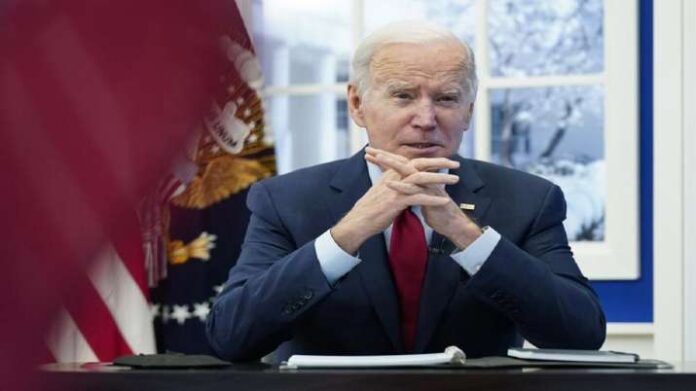| Translate This News In |
|---|
On Tuesday, President Joe Biden expressed concern but not alarm as the US established daily records for COVID-19 cases recorded, and his government attempted to allay fears of testing shortages, school closures, and other disruptions caused by the omicron version.
Biden made statements before a meeting with his COVID-19 response team at the White House, attempting to convey his administration’s seriousness in dealing with omicron and persuade apprehensive Americans that the current situation bears little resemblance to the pandemic’s start or last year’s terrible winter. Vaccines, booster doses, and therapeutic medications, according to the president, have reduced the risk for the vast majority of properly vaccinated Americans.
More Americans are employed this year than last, more children are in school, and deaths and major illnesses are on the decline, particularly among the immunised.
When questioned if the US had lost control of the virus, White House press secretary Jen Psaki replied, “We’re in a significantly different situation than we were a year ago.”
Nonetheless, in recent weeks, Americans have heard grim warnings about hospitals nearing capacity due to staffing shortages, thousands of holiday airline cancellations due to crews being ill or quarantined, and intermittent reports of school closures due to the more-transmissible strain.
Even if preliminary data shows the omicron variation produces less severe sickness than prior strains, Dr. Anthony Fauci, Biden’s top COVID-19 science adviser, told governors on a conference call that Americans “should not be complacent.” However, the number of persons infected with omicron “may surpass the beneficial impact of reduced severity” and “severely tax our facilities,” he added.
While most schools around the country are still open, Biden took aim at those that have closed, claiming that they lack the funds for testing and other safety precautions. He stated, “I feel that schools should remain open.”
The US is also tripling its purchase for a Pfizer antiviral drug that was just approved by the FDA to prevent serious sickness and death from COVID-19, according to the president. That’s a total of 20 million pills, with the first 10 million due in June.
By the end of January, 4 million medications effective against the omicron variety will be accessible, according to a top administration official, when paired with additional therapies such as monoclonal antibodies and convalescent plasma.
The pills are “a game changer” with the potential to “dramatically modify the impact of COVID-19 on this country and our people,” according to Biden.
Biden is under pressure to alleviate widespread shortages of tests that individuals use to see if they or their family members are infected. The administration’s image as having the pandemic under control was tarnished by long lineups and chaotic scenes over the holidays.
“I’m aware that testing remains a source of annoyance,” Biden said. “Believe me, it bothers me, but we’re getting better.”
Last month, the White House announced that it will provide 500 million free rapid antigen tests to Americans who wanted them, but they will not be widely available for weeks, if not months. The administration claims that these tests are in addition to the present supply of quick tests, and that even a little increase will help alleviate some of the shortages. Private insurers will also be required to pay for at-home tests starting later this month.
“I don’t have an update on that at this point in time,” Psaki replied when asked when the first testing would reach Americans.
Sens. Richard Burr and Roy Blunt, the senior Republicans on the Senate Health, Education, Labor, and Pensions Committee and a Senate Appropriations subcommittee on health, respectively, prodded the Department of Health and Human Services for answers in a letter written on Monday.
“With almost $82.6 billion specifically designated for testing and flexibility within the agency to provide additional resources via COVID-19 supplementary legislation or annual appropriations if necessary,” they stated, “it is mystifying to us why we are confronting such dire situations today.” “Rather than a cash deficit, it appears to be due to a fundamental lack of planning and the administration’s failure to anticipate future testing demands.”
Officials from the White House have stated that the surge in testing demand is due not only to omicron, but also to individuals wanting to travel securely during the holidays and return to school afterward, and that the shortages are global in scope.
“Turns out, Omicron is causing a surge in demand for testing…everywhere,” tweeted Ben Wakana, deputy director of strategic communications and engagement for the White House’s COVID-19 response team, citing similar shortages in the UK, Canada, and Australia.


















